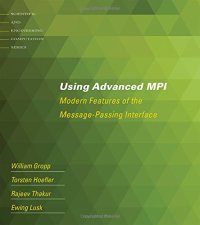
Ebook: Using Advanced MPI: Modern Features of the Message-Passing Interface
- Tags: Computer Science AI Machine Learning Bioinformatics Simulation Cybernetics Human Interaction Information Theory Robotics Systems Analysis Design Computers Technology Hardware DIY Architecture Internet Networking Mainframes Minicomputers Maintenance Repair Upgrading Microprocessors System Peripherals Personal Single Board Parallel Programming Reference Almanacs Yearbooks Atlases Maps Careers Catalogs Directories Consumer Guides Dictionaries Thesauruses Encyclopedias Subject English as a Second La
- Series: Scientific and Engineering Computation
- Year: 2014
- Publisher: The MIT Press
- Edition: 1
- Language: English
- pdf
This book offers a practical guide to the advanced features of the MPI (Message-Passing Interface) standard library for writing programs for parallel computers. It covers new features added in MPI-3, the latest version of the MPI standard, and updates from MPI-2. Like its companion volume, Using MPI, the book takes an informal, example-driven, tutorial approach. The material in each chapter is organized according to the complexity of the programs used as examples, starting with the simplest example and moving to more complex ones.
Using Advanced MPI covers major changes in MPI-3, including changes to remote memory access and one-sided communication that simplify semantics and enable better performance on modern hardware; new features such as nonblocking and neighborhood collectives for greater scalability on large systems; and minor updates to parallel I/O and dynamic processes. It also covers support for hybrid shared-memory/message-passing programming; MPI_Message, which aids in certain types of multithreaded programming; features that handle very large data; an interface that allows the programmer and the developer to access performance data; and a new binding of MPI to Fortran.